The Red Chinese championship pingpong team was coming for a picnic at my home at Wildwood Farms. It was May 1972 and and they would be the first Asian Communists to be welcomed into the United States since Mao Tse-Dong’s Great Revolution. It was an earth-shaking moment across the US, and it was politically controversial. In my journalistic bent, I wrote a report to keep it in memory. So as I begin my trip to the new China, next week, I thought sharing this would be appropriate.
 |
| Typical Posters – Red China |
Why pingpong? No one was really gungho about this particular sport enter-change. Sports, though, seems to have been the only way some of us could meet and talk with citizens of the nations the US Government blackballed from our lives. Memphians did not hang our banners of Mao Tse-Dong, nor wave red flags, nor seem interested (only 3000 spectators showed up for the pingpong match.) in this milestone. The public still held high their sabers as they remembered wounds from various wars and so the Red Chinese, being a Communist nation, were still the bad guys for America in 1972. And those were the days when if you were seen with a communist, you were one. I was not a “commie”, as they were called, but I had hope that somehow since we are all humans, we must start somewhere respecting each other and finding common grounds.
Yet, in that moment, the political taffy pull of having to be either Communist or Yankee was slowly becoming dust. The Chinese were humans like us with families, occupations, problems, comforts and discomforts just like us. When President Nixon broke through the form when he traveled to the East to meet with Mao Tse-tung, he invited someone from that place to come drink Coca Colas at our place. And it was on.
China held a mystery to me that had first been fanned by a childhood friend who lived across the street. Her name was Susie and she had lived in Peking among the splendors of the Mings and Shangs and Zhous, Imperial people with palaces and Great Walls and moo-goo-gai-pan. Susie’s father had worked for a major cotton company with roots in Memphis, and when China downsized into the Mao Manifestos, when everyone was required to read and carry the little red book of The Chairman’s Words, Susie’s family left. But with her dolls and silk jackets and her tales of Khubla Khan, Manchus and Mongols, her Mikado records about a good ship lollypop, I learned to dream. Sometimes she’d braid her red hair into flat buns over the ears, like imperial empresses, and we’d have green tea, real Chinese tea. And I envied her those things and her stories, wanting them to be mine too.
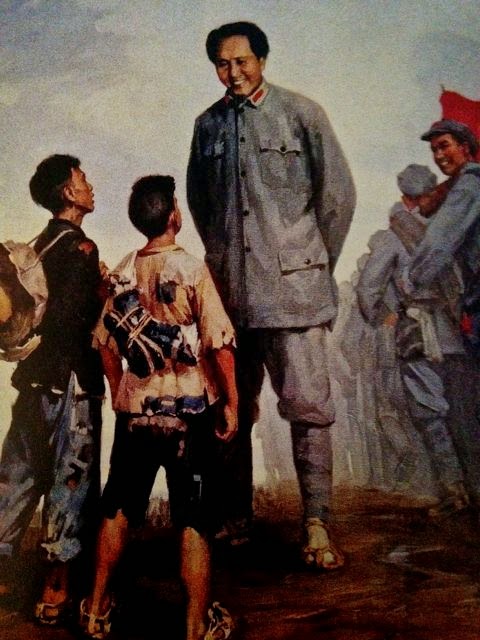 |
| Mao Loomed Large in All Life |
So how did I get involved when the first diplomatic hands had been offered to shake with the enemy? The world watched to see if this delegation, this professional pingpong team, unthreatening in it substance, really could make it across the States without an embarrassing incident. Could American control its own and have manners?
These were champion pingpong players, not the soldiers who had pecked holes in our army as we tried to salvage oriental face in Vietnam. But China was China and the local reactionaries had to protest.
Why me? After reading what seemed to me the boring itinerary of political stops and of their impending visit to our area, I wanted to offer help. Somewhere in all the mess of man, someone needed to share with these visitors and have nothing to gain by it. A trusted friend was in charge of the Memphis leg. I called him, offered the picnic, and he liked the idea. Nothing had prepared me for the real treat to come.
From the silence of the farm on that spring day, with the birds chattering to each other as they rested on branches, and the horses nipping each others rump, and the mower humming through the pasture keeping grass low, there arose, suddenly, at twelve noon, a noise as if the whole force of Blue Angel jets had conjugated in airspace over my house. Looking up, I saw three helicopters and at the same time five enormous buses, larger than the vans that carry the Budweiser Clydesdales, which often spent the night in our horse barns, came through the entrance and parked near the tractor shed. A whole small town emerged, taking off their jackets as they met the heat, and walking the short distance to my wooden house nestled among giant oak trees and a Japanese magnolia. Nana, the St. Bernard, greeted them with a sniff.
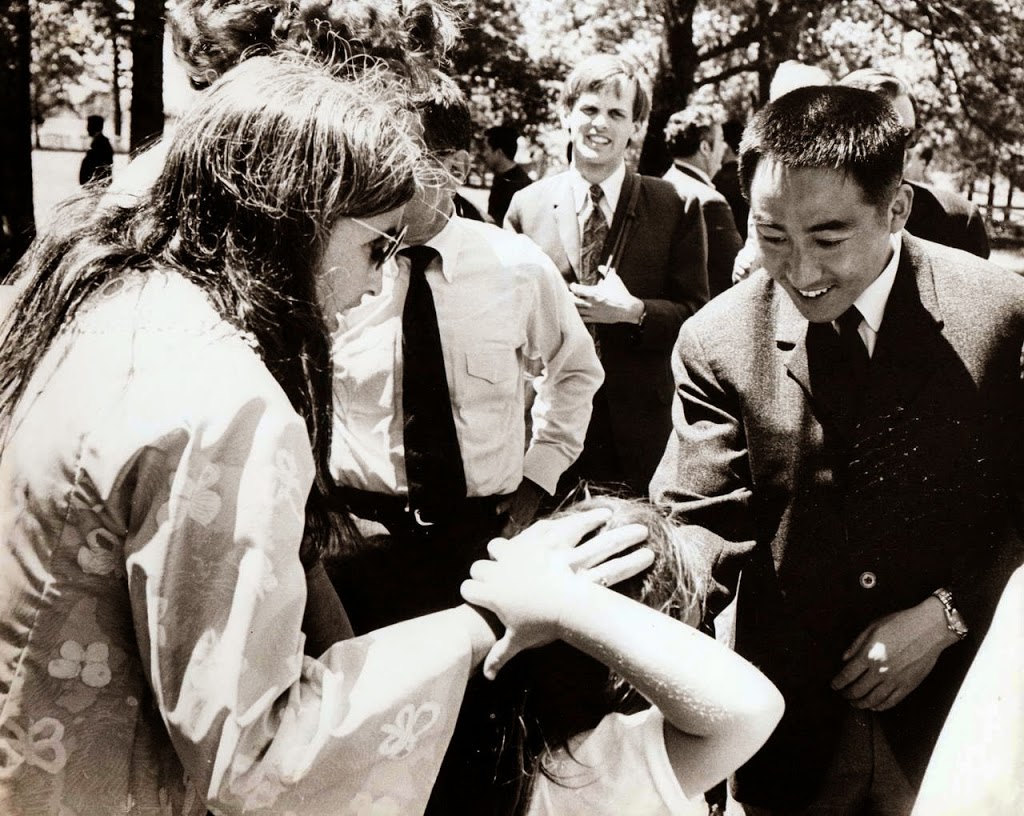 |
| Meeting the Chinese Team |
It was an assorted crowd and I had a hard time finding the 33 Chinese visitors – so many press with name tags, photographers with lenses like Pinocchio’s nose, smiling ”welcome hostesses” (young, long locked girls svelte in short skirts whose job was to encourage people to move on); FBI types in suits and ties with thin cables streaming from their hair: there were many more Americans than Chinese. As they arrived, the smaller people began to stand out in their simple gray suits and shiny black hair. Even women wore the same thing as men. Pregnant with my son, I was in a cheerful pink and lime green Lilly Pulitzer mumu, and my spouse was in his bellbottoms and hippy things as were some of the periphery people.
For awhile there was only photography, propaganda efforts to show how Americans and Chinese could get along, then one of the Chinese dignitaries suggested that the photographers get their work done, put down cameras and notepads, and let everyone relax and enjoy, which they did. Then the Chinese took off their jackets and began to enjoy the space of the open pastures filled with horses. Some men wandered through my art-filled house full of too many things (I felt), but the only comment was about our cat, a white Angora. They liked it.
The masses walked down to the horse barn to watch preparations for the regular Saturday polo match, and I presented the delegation leader, Chuang Tse-tung, who had been four times world champion ping-pong player, with one of my brother’s polo mallets, which he handled flipping it for flexibility and smiled. Polo, of course, came from the Orient, where Ghengis Kahn used the severed heads of war prisoners as polo balls for a chukker in the streets of sacked cities. After many bows and smiles gratifying the moment, the group returned to my front yard.
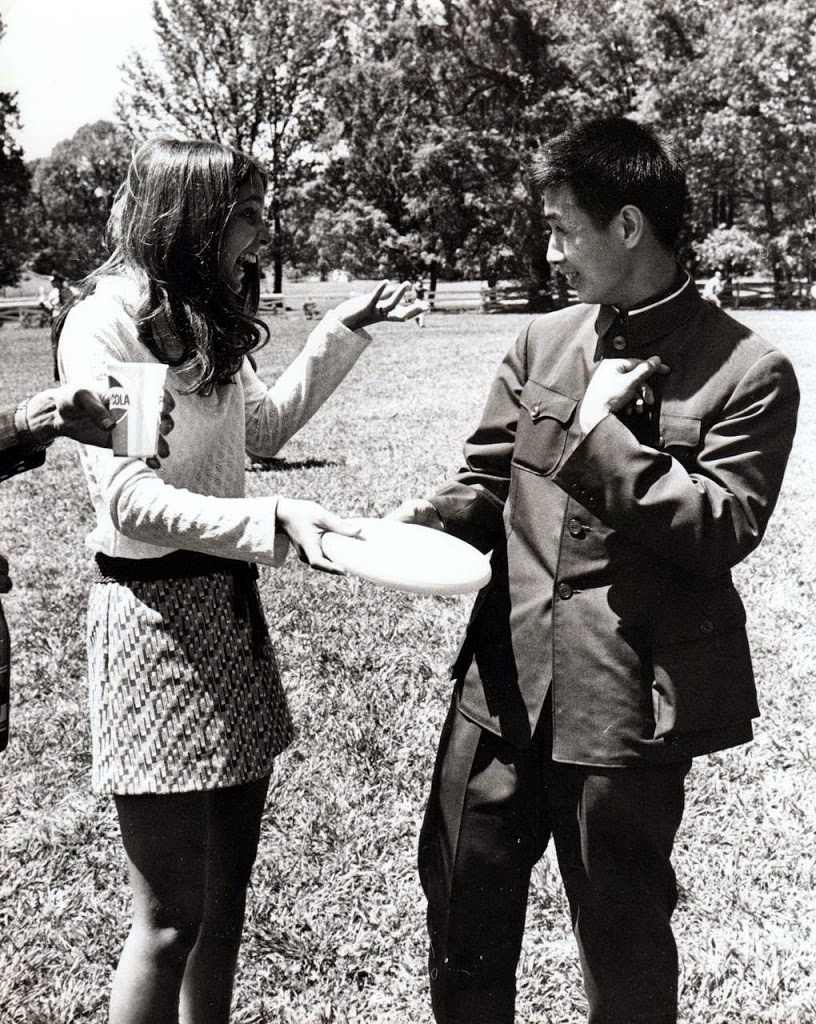 |
| What to toss? |
I had tried to find a momento of this day for each Chinese visitor. It was the age of hippies (love, peace and happiness) and we decided to share the hippie sport of Frisbee with them, and at that time, frisbees were not made in China. Immediately the fields were speckled with pink, yellow, green, white frisbees flying hither and yon like a bag of large confetti had been unleashed. When a frisbee flew over the hedge, a secret service man ran to retrieve it, ready for trouble, suspicious of everything. The Memphis police helicopters continued to clatter overhead.
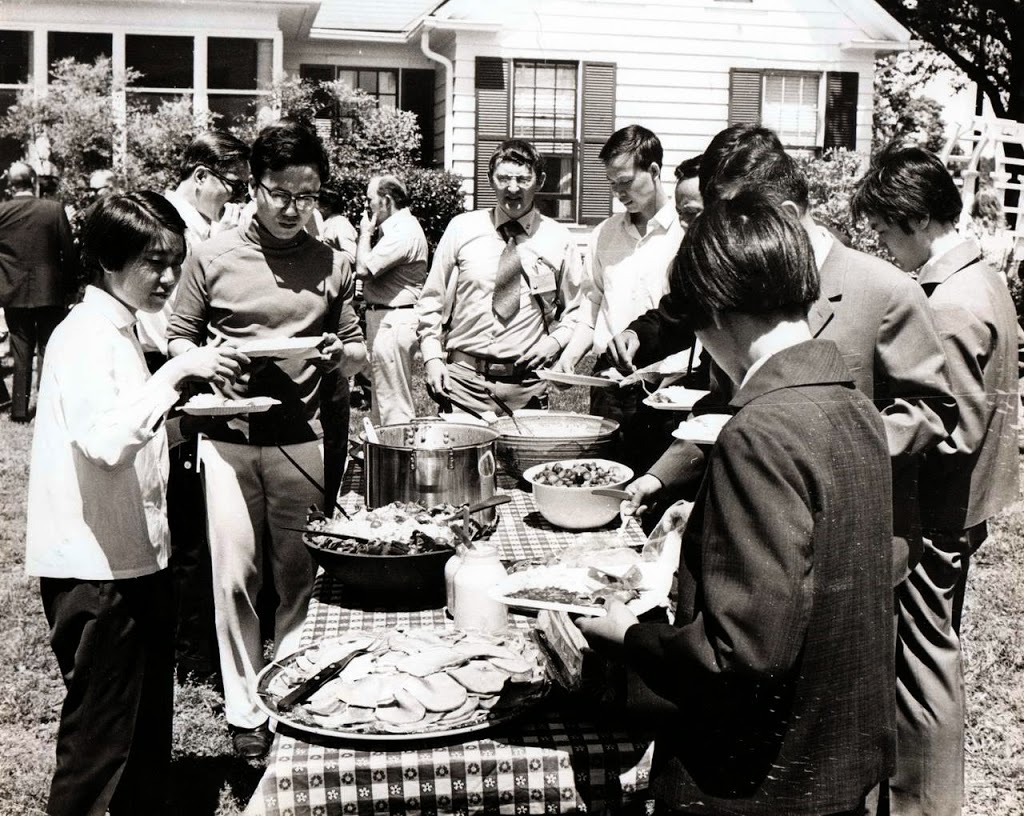 |
| Picnic is On |
Laughter and cheers were on everybody, even the staid coaches. This was what I had hoped for – getting along, putting down the armor, letting out curiosity, entering a relationship based on something other than politics and war. It didn’t matter who you were or what your believed, we were all made of the same seed and all had some things in common. Although I didn’t understand a word of Chinese, we communicated visually. It was slow through translators, and they often give a party-line translation.
When the time came for the picnic, the long tables, in red and white checkered tablecloths borrowed from my Mom, were ladened with the best of Southern hospitality; my homemade onion bread, gallons of coleslaw, potato salad, barbecued beans, cured Tennessee ham, and, just so they didn’t miss the experience, home-made chocolate chip cookies. They were most entranced by the cookies. In fact, the hundreds of news stories wired all over the world (some sent copies to me) made me look like nothing but a good chocolate chip cookie maker. Even a post-event newsletter from the Memphis Junior Chamber of Commerce wrote:
The writers of this letter are, collectively, world authorities on chocolate chip cookies, having, in all probability, consumed more of these in more places than anyone with whom you could come into contact. I would submit at this time that those to which we were treated on your farm are absolutely the world’s best, and we should be more than happy to endorse them as such.
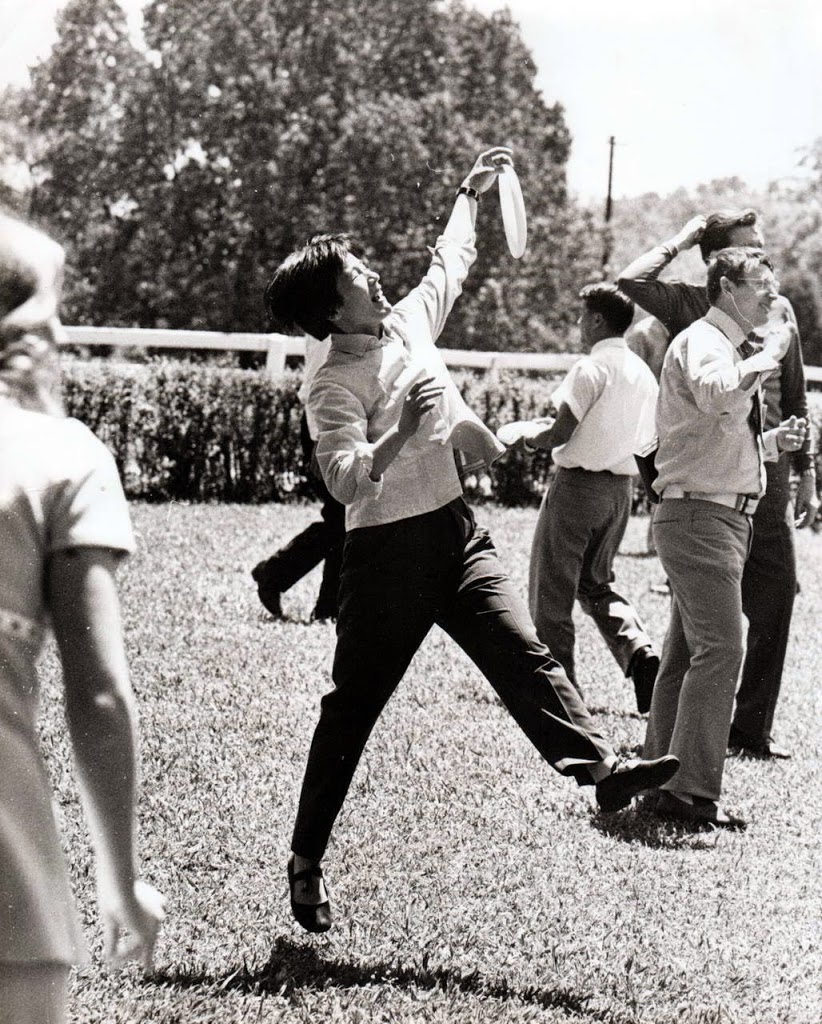 |
| Frisbee Catch |
More disarming, after all the effort, was the quote heard round-the-world, carried by all wire services, “I’ve never baked so many chocolate chip cookies in my life!”, I said. I had hoped I had said something a little more profound.
The group was so relaxed, they canceled a visit to a power plant, soy bean processor and an iron factory scheduled that afternoon so they could hang out on the lawn, throwing frisbees and watching an uncanny puppet show by local puppeteer (Jim Crosswaithe) with traveling stage, also red. I wondered if they really wanted to tour those industrial places, or if it was just expected of them as duty to the state. It was strange no one was booked to see Elvis’ house.
Chuang Tse-Tung presented to me a thank you gift, apparently the only one given on the Memphis leg of the trip. It was a silk embroidery rendering of the Peking Summer Palace made at The East is Red Factory in Hangzhou. As Chuang now back in his jacket, as was everyone else, spoke diplomatically through the translator, tape decks and pencils poised for his incoming sound, Chuang said:
“We are very very pleased to be here and to see around.”
I thanked him for the gift, bowing and feeling very humbled, and said I would like to see Peking – making it brief because having to be translated takes so long. (Do you look at the translator or the person being translated?)
I only hoped our guest could see there was nothing “staged” here but the puppet show. This was a moment of genuine freedom made by someone who just wanted to make a difference in their knowing Americans. It was surely Southern hospitality. Would they remember it when they returned to their families?
At 3 p.m., the whole farm emptied. The silence was so instant it was as if someone had been shot. The sparrows were voiceless. The tractors sputtering slightly in the distance. We picked up squashed paper cups and paper napkin balls, tried to figure out what to do with the leftover cold slaw, and sat in the hammock a moment to see if we could still hear the helicopters. But it was over.
I’ve often wondered what happened to those 33 Chinese and what sort of impression from these special encounters in America did they carry home. Although most of the reactions we received from our countrymen were “thank you”s, we received a few letters foaming at the edges: one from a middle Tennessee Baptist preacher who could not stop using the word “vomit.” From the father of a son killed in Korea, we were traitors by opening our doors to our Chinese “friends.” Well, the point wasn’t to please the right or the left wings but to follow God’s command to love all persons in all kinds of circumstances and as a true Southerner, to be hospitable. Now, 40 years later, I have the freedom to visit their mysterious, beautiful, historic and exploding nation and share it with my blog readers.

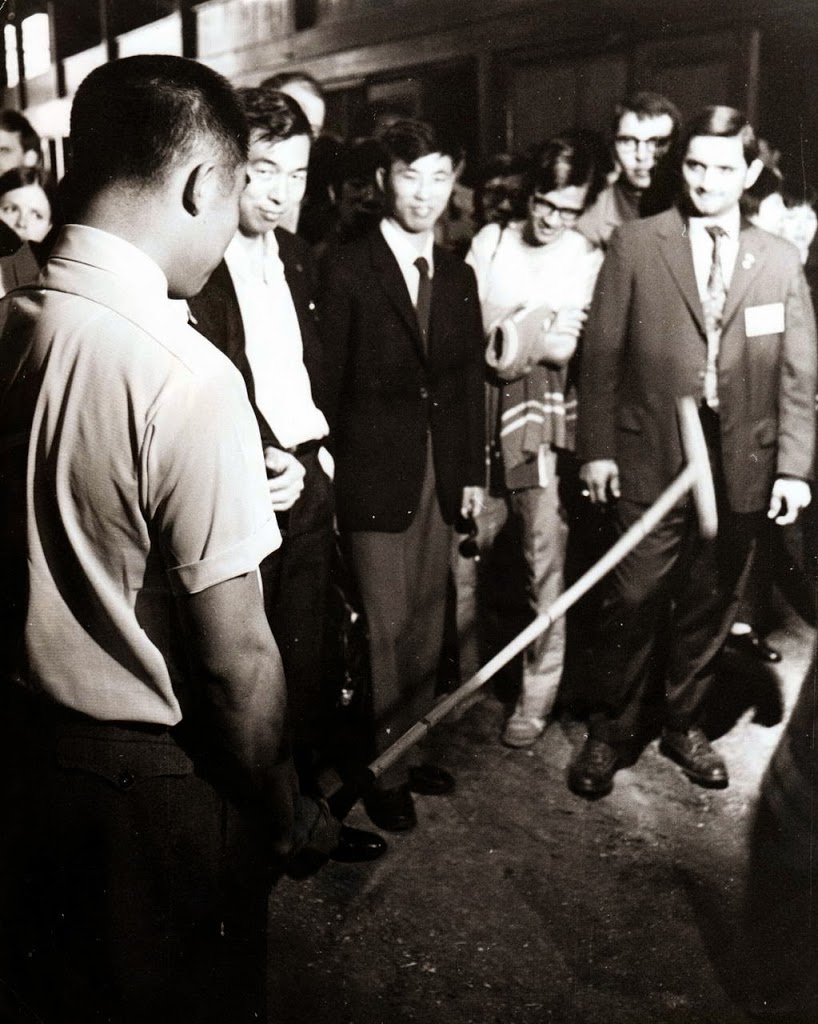
Audrey,
We remember when the Chinese Pingpong came to Memphis. What an honor it was that you were chosen to host them for almost the entire day. Of course, they could not have been in a better place and they without questions received warm, hospitable treatment they had never experienced before.
Your Blog is amazing–you are an amazing writer. After reading you words, we felt like we attended the picnic.
You will have an unbelievable adventure in China. We pray God will watch over you and keep you safe.
We love you very much,
Geraldean & Judge